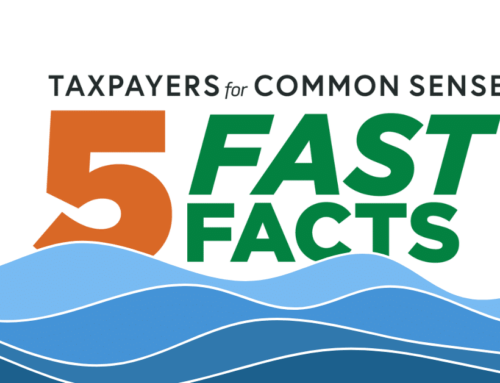The following is a statement by Ryan Alexander, President of Taxpayers for Common Sense, on S. 1813, “Moving Ahead for Progress in the 21st Century” (MAP-21).
|
For Immediate Release Contact: Steve Ellis Statement by Ms. Ryan Alexander, president, Taxpayers for Common Sense on Senate Passed Highway Bill: Bad for Transportation, Taxpayers, and Deficit Today, the Senate adopted “Moving Ahead for Progress in the 21st Century” (MAP-21): the nation’s long overdue reauthorization of federal highway and transit programs. Unfortunately, just like the last eight extensions of the 2005 highway bill, the Senate merely kicked the can down the road by failing to fix the broken highway trust fund that supports the nation’s transportation network. Even worse, to avoid grappling with the trust fund issues, the Senate adopted a smorgasbord of funding gimmicks and smoke and mirror budgeting that will only add to the nation’s crushing $15 trillion debt and leave the transportation program even worse off in the years to come. The Highway Trust Fund was created over 50 years ago to provide the nation’s surface transportation system with a stable and sustainable source of revenue. Supported largely by user fees—namely, federal gas taxes—improving vehicle fuel efficiency, stagnant growth in the number of vehicle miles travelled, and declining purchasing power of the tax has led to a gaping hole between trust fund revenues and the amount of money lawmakers want to spend. Instead of making the hard choices, the two-year $109 billion ‘MAP-21’ legislation taps general Treasury revenues to support the highway trust fund with a series of 10-year transfers and offsets of existing revenue sources. That’s right, they are using ten years worth of revenue to help pay for a two-year bill. To make matters worse, the offsets don’t kick in for five years–three years after this bill expires. Not only does this highly speculative budget practice subject the highway trust outlays to revenues that may never exist, but borrows ahead for today’s spending adding considerable debt to the nation’s already deficit-heavy treasury. To paraphrase Wimpy, the Senate would surely pay us in five years for some expensive road projects today. The Senate bill also reverses the user-pays principle of the nation’s transportation system. General revenues have little bearing on the actual needs of the nation’s transportation system. By transferring general Treasury revenues to the highway trust fund, Congress removes the responsibility from drivers—the primary beneficiary of the nation’s road and transit networks—and throws it on the backs of all federal taxpayers. Proposals emanating from the House and the Administration are no better than the Senate’s MAP-21, also tapping offset gimmicks of a different flavor. Instead of using 10-year pays-for’s and revenue provisions of little relation to transportation, Congress and the Administration should work to either restrain the transportation program to current highway trust fund revenue levels or find additional revenue sources paid for by the users of the transportation system. Failure to do so is a failure for taxpayers, the nation’s transportation system, and efforts to rein in the country’s trillion dollar deficits. ### 651 Pennsylvania Ave, SE • Washington, DC 20003 • Tel: (202) 546-8500 • |











Get Social